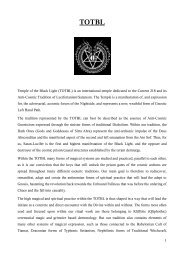Satanism Today - An Encyclopedia of Religion, Folklore and Popular ...
Satanism Today - An Encyclopedia of Religion, Folklore and Popular ...
Satanism Today - An Encyclopedia of Religion, Folklore and Popular ...
Create successful ePaper yourself
Turn your PDF publications into a flip-book with our unique Google optimized e-Paper software.
330 Appendix III: Satanist Survey<br />
challenged dropouts.<br />
One <strong>of</strong> the more remarkable findings was the<br />
extended length <strong>of</strong> time the average Satanist has been<br />
involved in the movement. The statistic that the typical<br />
participant has been a Satanist for seven to eight years<br />
indicates a level <strong>of</strong> seriousness I had not anticipated. It<br />
also demonstrates that their relative youth cannot be<br />
taken as indicating that Satanists are simply going<br />
through a youthful, rebellious phase.<br />
At the same time, the statistic that most became<br />
involved during their teens probably indicates that many<br />
initially became Satanists as a form <strong>of</strong> teenage rebelliousness.<br />
Their involvement did not, however, end after<br />
they left home. Rather, they went on to appropriate<br />
<strong>Satanism</strong> as a serious religious option. The fact that a<br />
majority <strong>of</strong> Satanists have looked into other religions<br />
shows that this was not an unconsidered choice, undertaken<br />
solely as a reaction against established religions.<br />
Also, though a reaction against Christianity may well<br />
have been a factor for some, too many respondents indicated<br />
that their religious upbringing was superficial,<br />
nominal, or nonexistent for this factor to explain why<br />
the majority <strong>of</strong> people become Satanists.<br />
The follow-up questionnaire contained a number <strong>of</strong><br />
open-ended items that asked respondents what role<br />
they felt rebelliousness played in the “recruitment” <strong>of</strong><br />
new Satanists, why individuals left <strong>Satanism</strong>, <strong>and</strong> how<br />
they regarded other religions. Many <strong>of</strong> the responses to<br />
these items were intelligent <strong>and</strong> thoughtful, <strong>of</strong>ten<br />
reflecting a maturity <strong>and</strong> insightfulness that exceeded<br />
my expectations.<br />
To begin with the “rebellion factor,” a few respondents<br />
diminished the role <strong>of</strong> rebelliousness, while others<br />
disparaged rebellious young Satanists, asserting, for<br />
example, that they should “GO HOME <strong>and</strong> solve problems<br />
with their parents.” Most were less negative, noting that<br />
this factor indeed played a significant part in creating<br />
new Satanists. One respondent went so far as to observe:<br />
“I think rebellion is the ONLY reason people initially<br />
come to <strong>Satanism</strong>. They want something more. A sense<br />
<strong>of</strong> self. A sense <strong>of</strong> power over their lives. A sense <strong>of</strong> selfimportance<br />
to some degree. They are tired <strong>of</strong> conforming<br />
<strong>and</strong> pretending to be something they’re not. Or<br />
they’re tired <strong>of</strong> being just like everyone else. Most people<br />
convert as teens.”<br />
The general tendency was to acknowledge the<br />
important role <strong>of</strong> this factor, but to indicate that, while<br />
many such adolescents eventually dropped out <strong>of</strong> the<br />
movement, some went on to transform their participation<br />
into something more serious: “There are many who<br />
are initially attracted to us because they think we are<br />
‘bad’ or ‘evil’ or <strong>of</strong>fer easy sex or drugs. These people very<br />
quickly weed themselves out <strong>and</strong> find somewhere else to<br />
be. The rare exception to this rule is those who find more<br />
than they had dared to hope for, <strong>and</strong> thereby become<br />
some <strong>of</strong> our strongest supporters.” One respondent<br />
made a distinction between two forms <strong>of</strong> rebelliousness,<br />
indicating that adolescent rebelliousness could mature<br />
into something “higher”:<br />
There is more than one kind <strong>of</strong> rebelliousness in the<br />
world, <strong>and</strong> I think it takes a certain kind <strong>of</strong> mature<br />
rebelliousness to become involved in <strong>Satanism</strong>. It<br />
takes a willingness to step beyond the safety boundaries<br />
<strong>of</strong> society, to become involved in the dark<br />
“underbelly” <strong>of</strong> our culture. I have seen two kinds <strong>of</strong><br />
rebelliousness in Satanists: the kind that I speak <strong>of</strong>;<br />
a quiet <strong>and</strong> mature rebelliousness that drives the<br />
person to seek out their own path, apart from the<br />
norm—<strong>and</strong> the kind that I have a great distaste for;<br />
the adolescent urge to shock. Admittedly, the adolescent<br />
urge to shock will always be a part <strong>of</strong> <strong>Satanism</strong>,<br />
but I regard it as merely a gateway to the “higher”<br />
kind <strong>of</strong> rebelliousness.<br />
Finally, another respondent expressed the opinion<br />
that Satanists needed to get beyond regarding rebellion<br />
as an end in itself: “It is always easier to destroy than to<br />
create, <strong>and</strong> to attack than to defend. If <strong>Satanism</strong> is to be<br />
more than a reaction, rebellion must be perceived as a<br />
tool <strong>and</strong> not as a goal.”<br />
When asked why people leave <strong>Satanism</strong>, respondents<br />
again provided a wide range <strong>of</strong> answers. Most<br />
observed that individuals <strong>of</strong>ten came to <strong>Satanism</strong><br />
during a certain phase <strong>of</strong> their personal unfolding, only<br />
to drop out after they completed that particular developmental<br />
stage. Nevertheless, many <strong>of</strong> these people<br />
“carry the same beliefs with them” after they leave<br />
(meaning that their personal philosophies continued to<br />
resonate with many Satanic ideals). One respondent<br />
noted that many participants dropped out <strong>of</strong> the movement<br />
after discovering that it failed to live up to<br />
Hollywood stereotypes: “I feel that some people<br />
stumble into <strong>Satanism</strong> thinking they will be able to do<br />
as they wish from powers given to them by the Devil<br />
(Satan) <strong>and</strong> when they realize that there is actually<br />
thought <strong>and</strong> intelligence within, they feel bored. Most<br />
want to be able to curse <strong>and</strong> kill or hate for no reason.<br />
Those who stay are sound in mind <strong>and</strong> spirit, <strong>and</strong> have<br />
a very strong will for life, or anything they do in life.”<br />
<strong>An</strong>d finally, one respondent articulated the idea that<br />
the people who did not drop out <strong>of</strong> the movement were<br />
“born Satanists”: “There is a saying that Satanists are<br />
born not made. Many people come to <strong>Satanism</strong><br />
because <strong>of</strong> their rebellious nature . . . however, not all<br />
are true Satanists. Some are just looking for attention<br />
from their parents, some are just there to shock people,<br />
but the true Satanists are there because [they find] a<br />
belief system [they already] believed in [<strong>and</strong> had] lived<br />
their entire lives.”<br />
<strong>An</strong>other questionnaire item that indirectly<br />
addressed the issue <strong>of</strong> the “rebellion factor” asked
















